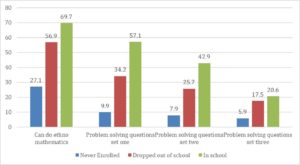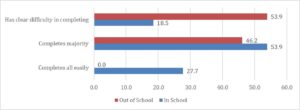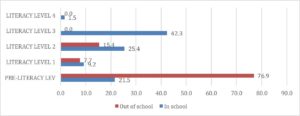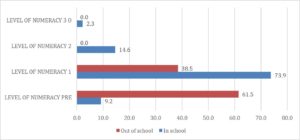ACCESS TO AND LEARNING OUTCOMES FROM EARLY CHILDHOOD EDUCATION: EQUITY CONSIDERATIONS FOR REFUGEES AND NON-REFUGEES IN UGANDA
By Bea Simpson, Mary Goretti Nakabugo and Ricardo Sabates | October 8, 2021.
This blog was a response to the September 2021 UKFIET conference presentation on ECE in Uganda. It was written against a backdrop of recent news of the arrival of 2,000 Afghani refugees in Uganda. It can be accessed here.
HOW DO OUT-OF-SCHOOL YOUNG ADULTS PERFORM ON UWEZO LITERACY AND NUMERACY ASSESSEMENT ?
By Yovani A.M. Lubaale | January 11,2021
There is a common Luganda saying that “failure to attain an education pains when one is old”. That is likely to be the fate of many Ugandans – grappling with the consequences in their old age. Despite the existence of a Universal Primary Education (UPE) government initiative began in 1997 to ensure education for all, many young adults have never been, or have dropped out of school. According to the 2014 Uganda Population and Housing Census, 13 percent of the population aged 10 years and above had never been to school in Uganda (UBOS 2017). In this same report, the net completion rate for primary was estimated at 9.8%.
Challenges of non-school attendance and dropout
Illiterate individuals have limited ability to obtain and understand essential information, and often lack representation. Currently in Uganda and world over, for many elective positions, there is a prescribed minimum education level that an individual must have before they are allowed to contest. Education usually determines employability of an individual. Many employers set a basic literacy requirement even when for work positions which only require manual labour. Not to mention, uneducated youths end up being employed in exploitative work environments where they are not aware of their rights and cannot speak up for themselves. In the COVID-19 era where remote learning relies on technological advancements, children of the uneducated poor parents are likely to be left behind due to lack the necessary tools in the home like smart phones, computers, and internet bundles. The cycle of uneducated generations continues.
Uwezo Uganda Assessments
This article is based on two datasets of the Uwezo Uganda assessments. The first dataset is the 2018 Uwezo Uganda National Basic Assessment (Uwezo 2019) data that was conducted in 32 districts out of 112 at that time. The other dataset is the Uwezo Uganda 2019 Pilot study for the Young Person Assessment that was conducted in Wakiso district in 10 Enumeration Areas (Uwezo 2020). To make the two datasets results comparable; we have considered individuals aged 14-16 years in both studies with special emphasis on those out of school and the dropouts.Using the 2018 dataset, we have considered the performance of children aged 14-16 years on a set of comprehension and enthno mathematics questions which express the relationship between culture and mathematics. The term requires a dynamic interpretation because it describes concepts that are themselves neither rigid nor singular-namely, ethno and mathematics (D’Ambrosio 1987, 2001). As such, irrespective of the individual’s level of education, one should be able to do an ethno mathematics question.[expander_maker id=”1″ more=”Read More” ]Read more hidden text[/expander_maker]
Figure 1: Performance in ethno Math and problem solving question among 14-16 year
Source: 2018 Uwezo Uganda learning assessment
Results indicated that performance in the ethno mathematics among young adults aged 14-16 years, was wanting among those who have never been to school. Only one in four young adults aged 14-16 years who have never been to school were able to pass the ethno mathematics question. This proportion of the never been to school who passed the second question dropped to one in ten (9.9%), for the problem solving question set one which required an individual to identify geometrical figures in the logic question. This further drops to one in fifteen (7.9%) for problem solving question set two which required the individual to rephrase an English statement. The last problem solving question required them to identify the number of triangles. Whereas this may seem easy and can easily be answered by primary two child, only one in twenty were able to identify the total number of triangles.
It was against this background that Uwezo Uganda decided to carry out a pilot study among young adults aged 14-20 years to measure their everyday functional adult reading, writing and math skills required in their everyday life. This was a pilot assessment whose focus was to develop and refine an approach of generating evidence to enable understanding of the long-term influence of school-based learning and other influences on adult functional reading, writing and mathematics.
Results on competencies of young adults aged 14-16 years
The startup activity for the pilot study required them to fill a personal information form provided. This required the young adult to read and fill in the name, sex, home address, date of birth, telephone number either for him/herself or for the parent or guardian, common language spoken at home, highest level of education, next of kin’s name, address and phone number, and what the young person aspired to achieve in future. Depending on how the individual filled in the results, they were grouped into three categories below:
- Completes all or almost all of the form easily and appropriately with little or no prompting or explanation
- Completes the majority of fields but may need some additional prompting or explanation AND/OR took more than 10 minutes to complete the form
- Clear and significant difficulties understanding and filling in the form
Figure 2: Rating of young adults (14-16) years in filling the startup form
Source: 2019 Young adults pilot study
From Figure 2, it can be observed that whereas 27.7% of the young adults aged 14-16 years in school were able to complete the startup form correctly and with eaey, none (0.0%) among those out of school, was able to fill in the form correctly. Most of the out of school young adults could hardly fill the startup compared to only 18.5% among those in school.
Since the startup form was used to try as much as possible to place the individual at a certain literacy level, none of the out of school young adult (14-16 years) was placed at a higher level (Figure 3 and 4).
Performance in literacy
Figure 3: Literacy levels of young adults aged 14-16 years N=143
Source: 2019 Young adults pilot study
Performance in Numeracy
Looking at literacy levels, over three in four (76.9%) of the young adults aged 14-16 years were categorized as pre-literacy level. Only one in six were able to reach literacy level 2. None reached literacy level three or four. This implies that many of the young adults out of school even if are working will not be able to understand the contracts that they sign.
Figure 4: Numeracy levels of young adults aged 14-16 years N=143
Source: 2019 Young adults pilot study
Similarly, with regard to numeracy 61.5% of the out of school young adults aged 14-16 years were in the pre-numerate level. One wonders how these young adults carry out their everyday life activities.
Discussion
The vicious circle of poverty, illiteracy among families can be historically explained. These young adults who will be parents (some already parents) within a few years may find it hard assisting their own children. Children of these young adolescents who are out of school are likely to continue in the same cycle unless a clear government policy is put in place to safeguard this imbalance. The government of Uganda created the Equal opportunities Commission and this is expected to help on this. It is time that the Equal Opportunities Commission analyses these imbalances and advise the government accordingly as we embark on e-schooling that has been introduced during the school shutdown. These assessments show that not much is currently being achieved. The onset of the COVID19 is more likely to increase this imbalance.
Conclusion
The findings from this analysis showed that the never-been-to-school young adults aged 14-16 cannot engage easily with literacy and numeracy tasks in everyday activities. The Uganda National Inclusive Policy section 5 in the introduction states that
“The Inclusive Education Policy provides an opportunity for all stakeholders in the education sector to address the diverse learning needs of various categories of citizens in the Ugandan education system under the universal design for learning and within a learner friendly environment for all”.
Secondly, the Government White Paper on Education 1992 Chapter Nine, pages 162-185 undertakes to bring people who are disadvantaged into the school system with different proposals.
This article has identified that despite the presence of Universal Primary Education (UPE) and Universal Secondary Education (USE), there is a section of the population that is disadvantaged hence very vulnerable in terms of education. Unless some of these imbalances are handled the country will not be able to achieve Vision 2040 (Republic of Uganda 2013). This may also explain why Uganda could not become a middle income country by 2017.
References
D’Ambrosio, U. (1987) Reflections on Ethnomathematics. ISGEm Newsletter, 3(1), 3-4.
D’Ambrosio, U. (2001) What Is Ethnomathematics, and How Can It Help Children in Schools? National Council of Teachers of Mathematics, Inc. Teaching Children Mathematics (Vol. 7, Issue 6 (accessed on January 6th 2021 from link
Republic of Uganda (2007) The Equal Opportunities Commission Act, 2007.
Republic of Uganda Ministry of Education and Sports (2020). The National Inclusive Education Policy 2020
Republic of Uganda (2013) Uganda vision 2040 (can be accessed from https://npa.ug/wp-content/themes/npatheme/documents/vision2040.pdf
Uganda Bureau of Statistics (2017) Education: a means for population transformation thematic series based on the National Population and Housing Census 2014
Uwezo Uganda (2019) Are our Children Learning? Uwezo Uganda Eighth Learning Assessment Report. Kampala: Twaweza East Africa
Uwezo Uganda (2020) Measuring Young People’s Literacy and Numeracy Competencies Required in the Workplace and Everyday Life: Report of a Pilot Assessment in One District of Uganda. Kampala: Uwezo Uganda
[1] Dr Yovani A.M. Lubaale is a Part-time Associate Professor at Busitema University. Between April-December 2020 he worked with Uwezo Uganda in the Research Unit
CONSIDERATIONS FOR RE-OPENING SCHOOLS POST-COVID-19: INSIGHTS FROM UWEZO SURVEYS IN UGANDA.
By Mary Goretti Nakabugo, James Urwick and Michelle Kaffenberger | May 28, 2020
Uwezo assessment results in Uganda imply that the curriculum and instruction framework will need to be adapted to meet the learning levels of the children upon return to school, post-Covid-19 school lockdown; https://riseprogramme.org/blog/reopening-schools-post-covid-uwezo



